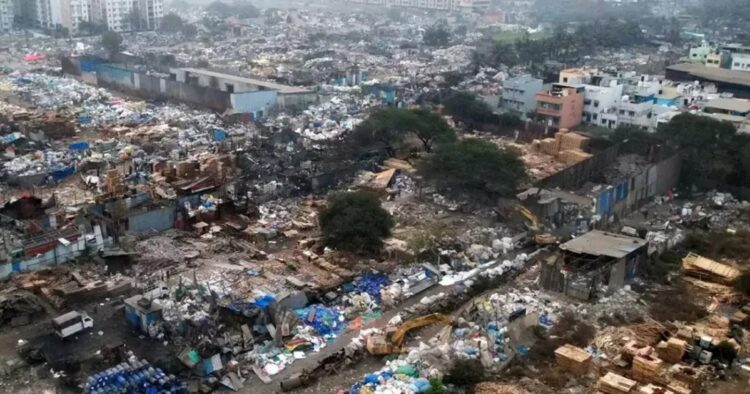In a decisive move to reclaim encroached public land and restore law and order, the Maharashtra government has launched a large-scale demolition drive in Kudalwadi-Chikhli area in Pune’s Pimpri Chinchwad. The operation has cleared 827 acres of illegally occupied land, demolishing 4,111 unauthorized structures, including illegal scrap shops, warehouses, and places of worship.
This crackdown comes after years of alleged political interference that had stalled action despite multiple warnings from the Maharashtra Pollution Control Board (MPCB) and the Pimpri Chinchwad Municipal Corporation (PCMC).
Local authorities had long expressed concerns about the area turning into a lawless zone, with illegal businesses operating openly and rising security threats. The December 8, last year, fire in an illegal scrap market, which highlighted the dangers of unchecked encroachments, served as a wake-up call. Reports suggest that at least 8-10 fire incidents occur in the area annually.
Allegations have surfaced that Bangladeshi and Rohingya illegal settlers were running many of these businesses, raising concerns over national security and crime.
Rising Crime and Political Controversy
The encroachments in Kudalwadi-Chikhli were linked to an increase in crime, including land grabbing, traffic congestion, and communal tensions. Reports claim that the illegal settlements had become hubs for criminal activities such as “land jihad,” where public and private properties were allegedly seized by encroachers.
Additionally, there have been claims of Hindu girls being lured into interfaith relationships under deceitful pretenses and past incidents of stone-pelting on Hindu processions. Security concerns were further heightened by past reports that the area had harbored individuals linked to terror outfits, including Indian Mujahideen’s Yasin Bhatkal.
The operation has faced pushback from certain political leaders. Reports suggest that settlers received backing from politicians such as Abu Asim Azmi and Aslam Shaikh. In response, calls have been made for a National Investigation Agency (NIA) probe into potential terror funding and links between these settlements and Pakistan-based terror outfits.
Massive Operation Led by Authorities
The demolition was executed under the leadership of Municipal Commissioner Shekhar Singh and Police Commissioner Vinaykumar Chaube. The operation was spearheaded by the PCMC’s Building Permission and Unauthorised Construction Control Department and supported by zonal rapid response teams. A massive deployment of law enforcement ensured the operation proceeded without resistance.
The operation involved 600 police officers, 180 Maharashtra Security Force personnel, and hundreds of laborers. Heavy machinery, including 16 excavators, 8 JCBs, 1 crane, and 4 cutters, was used to demolish the illegal structures swiftly. Firefighting vehicles and ambulances were kept on standby in case of emergencies.
Despite the large-scale clearance, the demolition of 27 unauthorized mosques remains pending. Maharashtra Deputy Chief Minister Devendra Fadnavis has been credited for standing firm against political pressure and ensuring that nearly 900 acres of encroachments were cleared.
Future Plans and Security Measures
The state government has vowed to continue its crackdown on illegal settlements, emphasizing the importance of reclaiming land for urban development and public amenities. PCMC has confirmed that the cleared area will be repurposed for city infrastructure projects, ensuring better facilities and security for Pimpri Chinchwad residents.
With increasing calls for an investigation into the funding and political backing of these encroachments, Home Minister Amit Shah and the Ministry of Home Affairs are being urged to conduct an official probe. The coming months will be crucial in determining the long-term impact of this action on the region’s security and urban planning.
This massive eviction drive, one of the largest in Maharashtra, marks a significant step in reclaiming public land that had been encroached upon for over 30 years. While the operation has been largely successful, the challenge now lies in ensuring that the cleared areas are not reoccupied and that law enforcement remains vigilant in preventing future illegal settlements.

















Comments